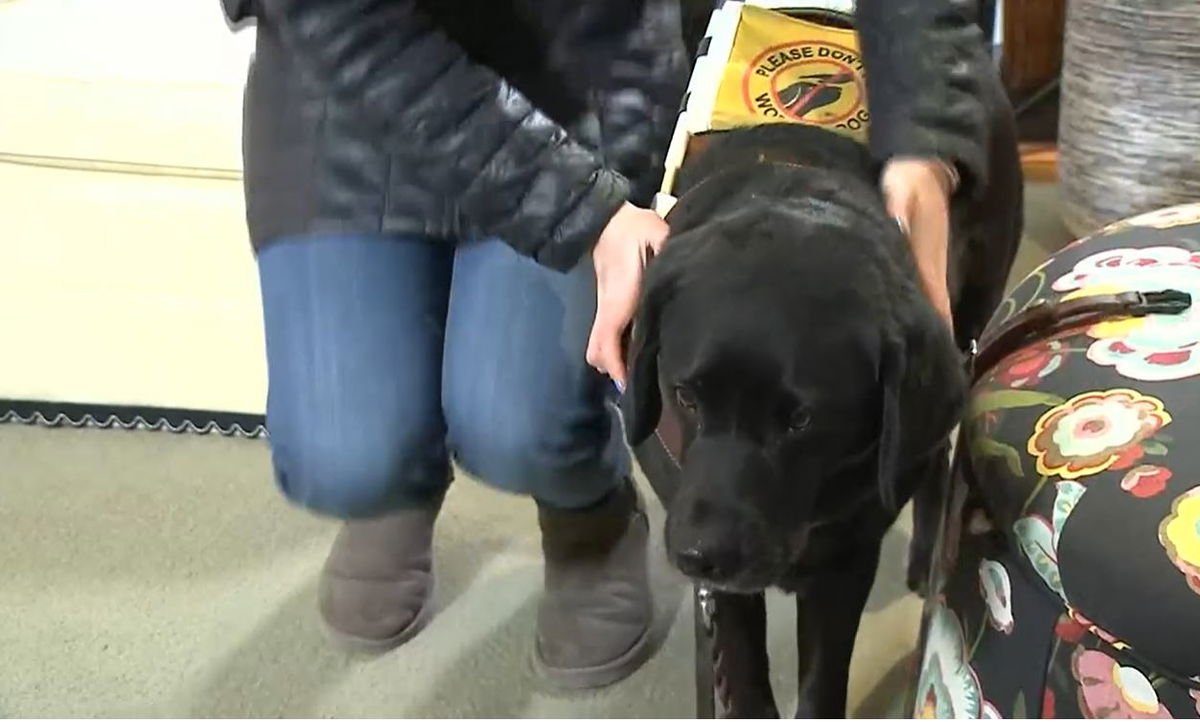Local woman claims discrimination over service animal

Annie Donnell says one of the biggest school districts in Missouri discriminated against her by not allowing her to take her service dog Hikari to her new job in a school.
By Lauren Trager
Click here for updates on this story
ST. LOUIS, Missouri (KMOV) — A local woman told News 4 Investigates one of the biggest school districts in Missouri discriminated against her by not allowing her to take her service dog to her new job in a school.
Playing tug, wagging her tail, and even taking news, black Lab Hikari is a good dog.
“I feel like I talk to her all the time, she’s my buddy,” said 25-year-old Annie Donnell.
But slip on her harness and she’s a different dog entirely.
“She knows this is my job, I have to get Annie from point A to Point B,” Donnell said.
Donnell is Hikari’s human.
“I have been born blind all my life, it’s all I know,” she said.
Born premature, Donnell can only perceive light or dark and nothing else.
“It’s part of me but doesn’t define who I am,” she said.
In fact, she’s always excelled: A track star in her hometown of Ladue and a marathon runner, Donnell’s always been a person with big plans.
“From a young age, I wanted to do something in education, maybe be a teacher,” she explained.
But while attending college, she decided a seeing eye dog could help her better navigate.
“I went to a two-week intensive training program and that’s where I was matched with Hikari,” she said.
They’ve been inseparable ever since.
“She has been a great seeing eye dog, my companion, my friend,” Donnell said. “She takes me around obstacles, stops at curbs and stairs.”
“I put all my trust in Hikari and she gets me safely there,” she said.
After graduation back in 2021, Donnell was thrilled to get hired as a paraprofessional through the Special School District. She told News 4 Investigates she was placed at Lafayette High School in the Rockwood district.
She’d work with a blind student, and of course, assumed Hikari would come too.
“I was really looking forward to it, to work with my student, with Hikari by my side,” she said.
Rockwood has a policy stating:
“All requests for … service animal(s) must be addressed in writing to the Superintendent and must be delivered at least ten business days prior to bringing the service animal to school..”
Donnell said she did that, but after a run around, “they basically said that I wasn’t able to go.”
She was sidelined, she said, to another job. Someone without disabilities took the position at Lafayette High instead.
“I think that definitely qualifies as discrimination,” she said.
It’s bothered her so much she’s suing the school district to raise awareness.
“It is an accommodation, but you don’t need the extra policy,” Donnell said.
“They should be invited in any work environment,” said Laura Park-Leach, the CEO of the St. Louis Society for the Blind and Visually Impaired.
She can’t speak to Donnell’s situation, but told News 4, in general, dog guides are clearly allowed under both Missouri and federal law. The Americans with Disabilities Act clearly defines what service dogs are and where they can go. Park-Leach said the laws also don’t require prior permission.
“The laws do not say there needs to be a timeframe,” she said.
But Park-Leach said there may still be some confusion.
“I think some people are not aware of what’s allowed, because it’s a small population who are visually impaired and even smaller population that use dog guides,” she said.
News 4 pulled policies from other school districts. St. Louis City, Parkway, and Fox-C6 school districts, for example, do not require any sort of prior notice for service animals.
We wanted to get more information from Rockwood. In the past five years, a spokesperson told us, Rockwood has received six requests for service animals and approved five of them: four for staff and one for a student. So, it’s unclear why Annie’s request wasn’t granted.
Through a spokesperson, the district said because of on-going litigation, they weren’t in a position to comment. Their attorneys, however, want a judge to have Donnell’s case tossed from court, saying her claims are neither timely, nor accurate and disputing there was discrimination.
The attorney representing the district did not return our requests for comment.
“I would like to see the policy no longer be a policy,” said Donnell.
Donnell and Hikari have since moved on to another employer. But she said she wants to ensure no other visually impaired person faces what she has.
“We have come so far with the ADA, but there is still so much more to be done,” she said.
Donnell’s case is still pending in federal court. It’s definitely something we’ll continue to track.
Please note: This content carries a strict local market embargo. If you share the same market as the contributor of this article, you may not use it on any platform.